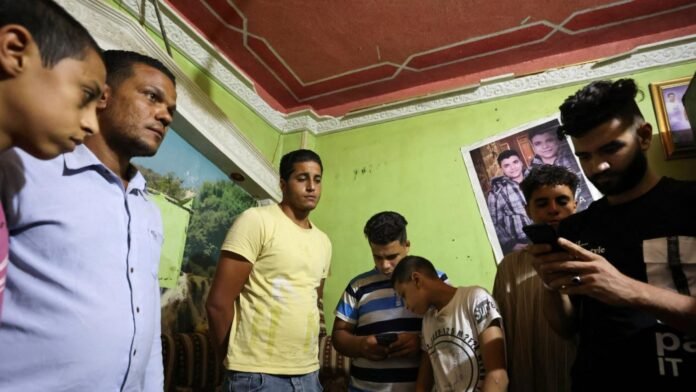Activists fear little information or oversight on how money will be spent as Sudanese report increasingly hostile reception at Egyptian border
EU foreign policy chief Joseph Borrell pleged new funds to Egypt on Monday to tackle the issue of migration and refugees, citing both the Sudanese war to Egypt’s south and last week’s deadly shipwreck off the coast of Greece.
Speaking alongside Egyptian Foreign Minister Sameh Shoukr, Borrell noted that Egypt has taken in 200,000 Sudanese refugees, saying the European Union would give Cairo 20m euros (roughly $22m) “to help you address this new wave of Sudanese refugees on your southern border”, without specifying how that money would be spent.
Borrell added that the shipwreck on 14 June, which left an estimated 500 people feared dead, indicated the need to “take fierce action against the smugglers and traffickers who put people’s lives in danger knowing the risks they’re going to take”.
He also called for the acceleration of the release of the 80m euros pledged to Egypt last year for border management.
This comes on the heels of a financial aid package of 1bn euros pledged to Tunisia, including a payment of 100 million for border management, aimed at killing “that cynical business model of the boat smuggler”, as Dutch Prime Minister Mark Rutte put it.
The deals have been criticised by human rights groups, who have highlighted how the flow of money could increase forced repatriations and abuses of migrants.
Last year, the EU signed an agreement with Egypt for the first phase of an 80m euro border management programme, as part of 300m euros in EU funding to Egypt. The package is intended to bolster Egypt’s borders through the procurement of surveillance equipment and training.
Egypt is already a recipient of the EU Emergency Trust Fund for Africa, which has invested 900m euros in funding to stem migration flows from sub-Saharan Africa.
Since then, EU-Egypt relations have intensified with the signing of a deal worth 60m euros signed in 2016.
A 2019 Statewatch report highlighted that flows of EU money have threatened the safety of refugees in Egypt and “arguably those of Egyptians as well” by bolstering Egypt’s policing capacities through equipment and training.
According to the report, the cooperation also saw a rise of deportations of Egyptian nationals from Italy and Germany in 2017-18, with a growing number of Egyptian refugees being denied international protection in Germany.
The report also emphasised the “disconcerting” absence of any comprehensive human rights monitoring mechanism within the cooperation.
“If we accept that the EU is going to engage in migration cooperation with countries like Tunisia, Morocco, Egypt, Libya [and] Turkey then at the very least, we have to see very, very clear and verifiable human rights conditionality,” Jude Sunderland, associate director for Human Rights Watch’s Europe and Central Asia division, told Middle East Eye.
“So [we need] very clear benchmarks that these countries have to meet in order to get the funds, use the funds, etc. And there has to be monitoring of that.”
Within Egypt, human rights groups have documented the systematic arbitrary detention of refugees who entered the country via “irregular” routes. In March 2022, Amnesty International reported that 31 Eritrean nationals, including women and children were forcibly returned following prolonged detention.
Citing “illegal activities”, Egypt recently announced tougher entry restrictions for Sudanese refugees earlier this month, reversing a visa exemption for women, children and elderly people.
Rooted in respect
Earlier this month, the EU pledged 1m euros in funding to Tunisia for border management. The package came as unprecedented numbers were attempting to cross the Mediterranean for Europe. According to the UN, 12,000 people have arrived on Italy’s shores from Tunisia so far this year, compared with 1,300 in the same period of 2022.
The deal promised to facilitate increased search-and-rescue capacity and returns “rooted in respect for human rights”.
“In general, with respect to these agreements… they’re quite opaque and it can be very, very hard to actually follow the money and figure out exactly how it’s being spent,” Sunderland told MEE. “Usually there is some human rights language… But it falls far short from clear, verifiable benchmarks.”
‘All this support is under the guise of saving lives. They’re very good at deploying the rhetoric and not the ships’
– Jude Sunderland, Human Rights Watch
The uptick is accompanied by a sharp rise in fatalities on the sea border, with the Tunisian coastguard reporting that 210 bodies were recovered along the route within two weeks in June.
The surge has also led to an increase in violent interceptions by the Tunisian coastguard, bolstered by EU training, surveillance equipment and $39.5m in funding via the EU Trust Fund for Africa. In the first quarter of 2023 alone, 14,963 people were violently intercepted in Tunisian waters.
“All this support is under the guise of saving lives,” Sunderland said. “They’re very good at deploying the rhetoric and not the ships.”
“If EU politicians and decision makers were genuine in their commitment to save lives at sea, then there are a whole host of other measures that they should be prioritising, including their own state-led proactive search-and-rescue missions in the Mediterranean Sea,” Sunderland added.
While the fishing boat carrying an estimated 700 people sank on 14 June, three NGO vessels remained under detention by the Italian authorities after they were found to be in breach of a new Italian law preventing search-and-rescue vessels from performing multiple rescues in one mission.
Source : Middleeasteye

